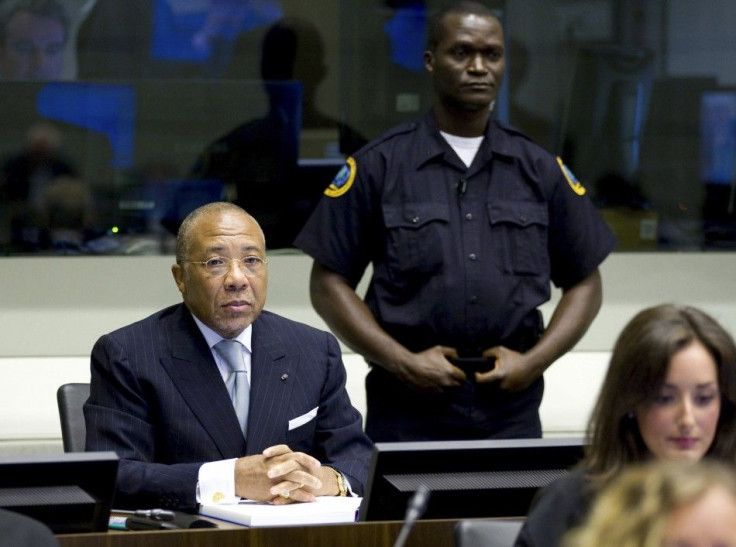Former Liberian President Charles Taylor Convicted Of War Crimes

Former Liberian leader Charles Taylor was found guilty of aiding and abetting crimes against humanity -- including murder, rape, terrorism and the conscription of child soldiers -- by an international court on Thursday.
Presiding judges of the Special Court for Sierra Leone -- a joint Sierra Leone-United Nations court established to deal with the atrocities of the Sierra Leone Civil War -- found Taylor guilty of providing arms, ammunition, communications equipment and sustained and significant support to rebels, and of helping the rebels plan countless crimes. However, he was not found guilty of committing or ordering the crimes himself.
Taylor's conviction sends a powerful message that even those in the highest level positions can be held to account for grave crimes, stated Human Rights Watch senior counsel Elise Keppler.
Not since Nuremberg has an international or hybrid war crimes court issued a judgment against a current or former head of state. This is a victory for Sierra Leonean victims, and all those seeking justice when the worst abuses are committed.
Who is Charles Taylor?
Taylor is both politician and warlord. He once brought peace to Liberia, but was also partly responsible for plunging the country into a horrific civil war.
The American-educated Taylor's career began in the 1980s, when he worked for Liberian president Samuel Doe. After Doe fired him over accusations that Taylor embezzled $1 million, he created the National Patriotic Front of Liberia and launched a rebellion to overthrow Doe in 1989. The rebellion turned into the First Liberian Civil War, which lasted from 1989-1996 and resulted in both the brutal torture and murder of Doe and the election of Taylor as president. The man who actually ordered Doe's assassination -- and videotaped it -- is Prince Johnson, who is now a senator.
More than 200,000 people died during the civil war, which also displaced a million others. Taylor's troops were notorious for cutting off the limbs of enemies and civilians alike, and his soldiers have been accused of crimes ranging from rape to cannibalism. Additionally, Taylor's use of child soldiers is well documented, many of whom were fed drugs to keep them loyal, CNN pointed out on Thursday.
In what was a tragic symbol of Liberian politics at the time, Taylor won election in 1997 under the unofficial slogan You killed my ma, you killed my pa. I'll vote for you.
But the war crimes trial is not related to violence in Liberia, but rather in neighboring Sierra Leone, which was subject to its own bloody civil war. Taylor was found guilty of arming rebels in exchange for uncut diamonds -- the so-called blood diamonds extracted from mines in Sierra Leone by children and forced laborers.
The Charges
After signing a ceasefire with rebels at the end of the Second Liberian Civil War and stepping down from power in 2003, Taylor fled to Nigeria where he was arrested in 2006. Taylor was taken to the Special Court for Sierra Leone in Freetown, and then eventually transferred to The Hague, where the trial opened in June 2007.
Taylor was charged with 11 counts of war crimes and crimes against humanity related to the war with Sierra Leone, and pled not guilty to each. The trial lasted five years and Taylor himself spent seven months testifying. He called the trial a “vindictive” political witch-hunt concocted by former colonial powers.
A total of 94 witnesses were called during the trial and nearly 800 pieces of evidence examined, the Los Angeles Times reported. Among the more memorable moments of the trial was testimony from supermodel Naomi Campbell, who allegedly received a gift of 'blood diamonds' from Taylor, and actress Mia Farrow, who attended the same party with Campbell and Nelson Mandela.
The Sentencing
The sentencing hearing has been scheduled for May 16, with a final sentence being handed down two weeks later. Taylor faces up to life in prison, which would be served in Britain.
It is important to recognize that Taylor may appeal the verdict, and that his guilt is not fully established until the end of the judicial process, United Nations human rights chief Navi Pillay said on Thursday.
Nevertheless, whatever the final outcome, this is undoubtedly a historic moment in the development of international justice. A former president, who once wielded immense influence in a neighboring country where tens of thousands of people were killed, mutilated, raped, robbed and repeatedly displaced for years on end, has been arrested, tried in a fair and thorough international procedure.
The Reaction
Taylor's conviction was widely met with joy in Liberia, and Sierra Leone said that the verdict with help strengthen the relationship between the two countries.
I'm overjoyed with the verdict. We've been waiting a long time for this, a man named Alhaji Jusu, who lost both his hands in the war, told the BBC.
“Shame on you Charles Taylor. Give us your diamonds before going to prison, read a sign in Monrovia, Liberia.
However, Taylor still has many supporters in Liberia and the government had to issue a statement to urge calm. Press Union of Liberia President Peter Quaqua told the Voice of America that there is mixed reaction and mixed feelings in the country but hopes that Liberians can accept the verdict “irrespective of our differences.”
© Copyright IBTimes 2024. All rights reserved.











